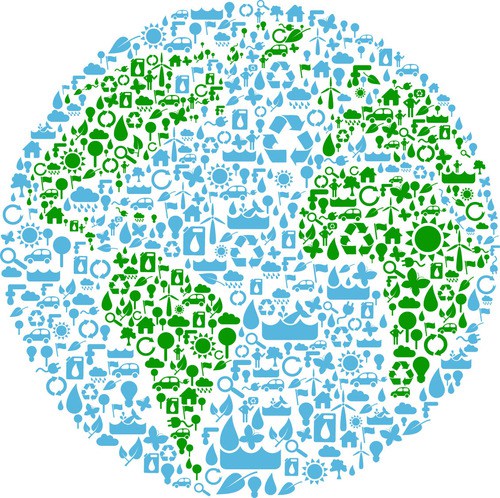
What to know about the relation we have to maintain with our planet? In occasion of the International Earth Day, an invitation to reflect on our role as “temporary lodgers” of Earth.
A few days ago, I peered out of the window at the bare tree in front of my desk and I saw something amazing – little green buds of joy were appearing after a long winter, signalling the start of spring and the continuing cycle of the natural world. How amazing is it, that every year the same thing happens without fail I thought to myself but then I got jolted back to reality by my lecturer pointing to some alarming climate news.
When I sit there in University and see the sobering graphs and statistics that show how the temperature, ecosystems and climates of the earth are changing due to the human race it scares me. I hear the numbers, think of the future and it is a terrifying picture – one guaranteed to keep us awake at night if we would truly listen, which we don’t always do.
Sometimes we sit around the table with the researchers at the department, all of them looking at deeply troubling news on a daily basis and we ask them – “how can you stay positive?” They all have different thoughts and ideologies that keep them grounded and forward thinking and over the past few months I have started to ask myself what Judaism has to say about this.
There is a cartoon by the New Yorker that has a sobering message – it shows a family sitting by a fire dressed in tatters and the caption states “Yes, the planet got destroyed. But for a beautiful moment in time we created a lot of value for shareholders”. How sad would it be if that turned out to be the case?
Rabbi Nachman tells us “the whole world is a very narrow bridge and the main thing is not to be afraid” – this is something that resonates deeply with a very holy friend of mine. Talking to him not so long ago, I heard that we should not worry about Climate Change because G-d is looking out for us and that things will be okay because everything comes from above. This is a nice and comforting thought (if we are to believe that a higher power is looking out for us) but do we not have our own responsibility to be the keepers of this earth, surely the consequences of anything we do will fall on us and our children?
Now, when it comes to these issues – I often feel as though there is something deeper than just the simple question, to use or not to use a disposable plate or fork. In our individualistic and self-centred existence, we can look at the earth as a resource – something there for us to exploit as long as we can. In fact the Mishna in Sanhedrin (4:5) states that “everyone has to say – the earth was created for me”. This Mishna can be taken out of context and sometimes is, to enable us to feel better about squandering the earth’s resources, polluting and destroying everything we see.
However looking at the start of that same Mishna, we can see the context of the sentence – the entire world was created for each and every single one of us, so how can we dare take a human life without due consideration. This is what feels to me like the real Judaism, that of being careful with nature – looking after the environment and realising that there are things greater and more important than ourselves.
So many of the laws of Judaism relate to land, agriculture and the seasons – even our calendar adds in an extra month in order to keep us in sync with the natural world. This should serve as a reminder to us, of how inextricably we are linked to the planet that we live on and we must take on the responsibility of ensuring that these seasons continue long after us. There is a cartoon by the New Yorker that has a sobering message – it shows a family sitting by a fire dressed in tatters and the caption states “Yes, the planet got destroyed. But for a beautiful moment in time we created a lot of value for shareholders”. How sad would it be if that turned out to be the case?
Going back to our message from beforehand – we cannot be pessimistic, as Rabbi Nachman says “there is no giving up in this world at all”. Judaism can give us that push to care and look after the natural world while allowing us to look at the bigger picture and not drown in the weight of the responsibility. As the Mishna in Avot (2:21) states: “לא עליך המלאכה לגמור, ולא אתה בן חורין להיבטל ממנה” – we do not have to finish the job but we also cannot raise our hands and ignore the responsibility. Each and every one of us is necessary but we must work together to achieve change, specifically in this battle against Climate Change.
When we think of the things that we can do for the Earth, the list is endless: we can decrease our emissions (and increase our health) by walking/cycling more and eating less meat. Simple ideas to stop waste (another very strong Jewish tenet) can reduce our impact on the environment and make future generations think better of us. There is a famous saying by the great conservationist John Muir “leave nothing but memories, take nothing but pictures, kill nothing but time”. If this can be our motto wherever we tread, I believe that this coming Earth Day (April the 22nd) will bring all of us a new and heightened appreciation for the wonderful planet we live on.
Ronni Gurwicz is a Public Speaking Coach and Ecosystem Sciences Student at Lund University, Sweden. He grew up in the UK and has lived and worked in various countries including Israel and the USA in the teaching, religious and environmental fields.
Ronni Gurwicz è un Public Speaking Coach e studente di Ecosystem Sciences all’Università di Lund in Svezia. È cresciuto nel Regno Unito e ha vissuto e lavorato in diversi paesi, tra cui Israele e USA nei campi dell’educazione, della religione e dell’ambiente.
